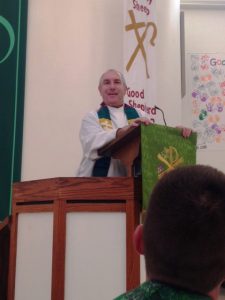Transfiguration Sunday, Narrative Lectionary Year 3
Lessons: Luke 9:28-45, Psalm 36:5-10 (or 36:9)
Theme: God’s faithful and generous people may be afraid or feel ill-equipped to share their faith, but we have every reason to be bold as stewards of this very good news.
Key Scripture: “And they kept silent and in those days told no one any of the things they had seen.” Luke 9:36b
Preaching/Teaching Reflection
When was the last time you felt really BOLD about your faith? I have to admit that my own thoughts in response to this question gave me reason for pause. Although I’m an introvert by nature, I get excited about the gospel and about what God has done in my life. I’m living proof that God can take the most unlikely of followers and call that person to servant leadership. Most of the time I feel pretty bold in proclamation, although even after preaching for almost 14 years, I still get nervous, don’t sleep well on Saturday night, and  feel the weight of my stole and call every single time I step into a pulpit. I’ve felt bold in the spirit to minister to the dying, the grieving, and the suffering. I’ve been humbled on a regular basis by the call to serve God’s beautiful, broken people. But BOLD? Boldness is a descriptor I generally do not ascribe to my demeanor.
feel the weight of my stole and call every single time I step into a pulpit. I’ve felt bold in the spirit to minister to the dying, the grieving, and the suffering. I’ve been humbled on a regular basis by the call to serve God’s beautiful, broken people. But BOLD? Boldness is a descriptor I generally do not ascribe to my demeanor.
So if I feel this way, after years of ministry and plenty of higher education, how much less bold might the everyday faithful folk who comprise Christ’s body be feeling about their faith and the sharing of it? I still remember with sadness the earnest high school student who confessed to me that she used to think she knew how to pray, but that her confirmation teacher convinced her she didn’t. I’ve known many congregants who were reluctant to engage in the corporate study of scripture for fear of appearing “stupid” or “ill-equipped” for discipleship. Overall, at least in North American mainline circles, I’m not sure BOLD is the primary word many of us would use to describe our faith. In fact, many faithful disciples are mute when it comes to sharing this aspect of life. Sure, we’ll talk about work, politics, sports, the weather, and our grandkids. Just don’t ask us to share what Jesus means to us!
This week’s lesson is Luke’s account of the transfiguration, which includes Jesus revealed in his glory, alongside Moses and Elijah, Peter’s attempt at holding onto this vision, and God’s voice from heaven. It’s a powerful and bold moment. Unfortunately, it is followed by an all-too-human account of the three disciples being tongue-tied about the experience: “And they kept silent and in those days told no one any of the things they had seen” (Luke 9:36b). We don’t know if it’s fear, timidity, or confusion at play. There’s nothing in Luke’s account about Jesus shushing them. In fact, in the very next scene we encounter the man with a demon-possessed son that the disciples have not been able to cast out. Was it a lack of faith? Fear of failure? Doubt? Whatever the reason(s), a lack of boldness seems obvious.
 What keeps us today from acting with great boldness in the name of Jesus? We have seen Christ’s light shine in the dark corners of our world; we have encountered our Lord in the waters of baptism and in the wine and bread of communion. We are promised that we have all that we need to act boldly in going forth and making disciples, and we are truly free in Christ to serve, love, and live. We are not alone.
What keeps us today from acting with great boldness in the name of Jesus? We have seen Christ’s light shine in the dark corners of our world; we have encountered our Lord in the waters of baptism and in the wine and bread of communion. We are promised that we have all that we need to act boldly in going forth and making disciples, and we are truly free in Christ to serve, love, and live. We are not alone.
Here’s the good news we have to share with folks who are timid, downtrodden, terrified, or even just plain old bored: We are no longer separated from seeing and experiencing God’s glory, thanks to Jesus. We do, however, need to listen to him. And then, having heard, we are called to act in the power of the Spirit of God. We may feel awkward. We may not have it “all together” or feel eloquent in our presentation, but that doesn’t matter. We can act boldly in the beautiful freedom of God’s love, trusting that this is enough and that God goes with us–always. That, dear friends, is news worth sharing and news worth remembering every time you proclaim the gospel or share your faith.
In Worship
Remember the phrase “Kodak moment”? The Urban Dictionary defines the term as 1) a nice image for a picture, or 2) a horribly twisted event (sarcastically). We in the church often find and seek to hold onto our “Kodak moments.” We look at times when we were at the “top of our game,” and we look with nostalgia on the “good old days.” We want to preserve what we know or remember or think to be good and precious. This was true for Peter, James, and John when Jesus took them to the mountaintop. They got a glimpse of Jesus in his glory, and they wanted to preserve this moment–even though they were plainly terrified. They quickly learn that Jesus cannot be contained in a moment or a fleeting image or an event. Jesus is found in the down and dirty, extraordinary ordinariness of daily life, where we do ministry and are the Body of Christ sent into the world. How might you in worship this day lay down those “Kodak moments” to which the church tends to cling and walk on down the mountain into mission?
Consider passing out “photo frames” from clip-art or that you draw. Invite people in one frame to capture in image or words (if they don’t like to draw) their ideal image of the church. What do they remember as the glory days? What speaks to them the church at its best? Then invite them in small groups or in pairs to look at their images and see whether these are indeed the images that Jesus would see or whether we are trying to hold onto a moment that is long gone or that isn’t for this day and the future? Now invite them to prayerfully envision going down the mountain from the church as it once was in memory and nostalgia into the dirt and pain and suffering of today’s beautiful, broken world. What words or images come to mind? Have folks process these images and share any observations. Invite them to leave their old images in a trash bin located in a prominent location and then to put their images of a hopeful future into a basket that can be placed on the altar. Pray over these images of the now and future church during the season of Lent. Ask God to guide you down from the mountain of memory into a tenacious tomorrow where Word meets world and disciples are boldly sent.
With Youth
“Listen to him” says the voice from Heaven, from all around them, infusing every pore and molecule with its sound and timbre. It’s easy to get distracted by what we see. Peter, James, and John were both overcome and terrified by seeing a glimpse of Jesus as God’s beloved Son. They “knew” in a sense that their beloved rabbi was the Messiah, but they had not seen with their eyes the divine difference. They wanted to stay in the moment–to preserve it forever. The voice of God reminds us that there is something more important than clinging to an idea, image, or vision. We are called to listen to Jesus. How do we do that today? Invite youth to contemplate a prayer discipline for Lent that would encourage them to listen for Jesus. You might wish to teach them to use Lectio Divina as a way of reading scripture and listening for the voice of God in the words, or perhaps you would introduce the Ignatian spiritual practice of the Daily Examen to them. In short, give them something to work with in Lent that will help them listen more fully for God’s voice in their lives. Don’t underestimate the ability of youth to grasp and integrate these ancient practices; they are capable of great surprises and depth when we believe them to be.
With Children
Shine, Jesus, Shine!
This week we celebrate the Transfiguration. So what does that mean? How can we imagine what the disciples saw? Show the children a light bulb. You can talk a little bit about how the light bulb is a wonderful power source–complete and self-contained, able to shine light into the darkest corners. But why doesn’t it work on its own? Of course, it needs a power source! Bring out a small lamp. Screw the light bulb in. What? It still doesn’t work? Of course not! It’s not plugged in. Plug in the lamp to an outlet or extension cord. Then see how it shines light. We’re the same way. God has made us in the divine image. We have all we need to shine thanks to our baptism and gift of the Holy Spirit, but we MUST be plugged in to our power source–to God. How do we do that? We worship. We learn. We come to Christ’s table. We serve. We develop relationships. And we share our resources. Then we truly do shine with the light of Christ. Consider singing “Shine, Jesus, Shine.” End with a simple prayer.
Weekly Stewardship Bulletin Insert
Would you describe yourself as bold when it comes to sharing your faith with others? Too often God’s faithful people are shy or even terrified to share their faith story. Perhaps there is a fear of rejection, the possibility of causing offense, or more likely, not feeling equipped to be an effective bearer of the Good News. Like any aspect of stewardship, sharing our faith takes practice, and the best place to do that is in community with our sisters and brothers in Christ’s Body—the church. How can you exercise your faith-sharing muscles this week? Pray that God will give you opportunity to do so, and then don’t be surprised when that opportunity comes!
Stewardship at Home
This week try writing and practicing a faith story “elevator speech.” This is a condensed version of why Jesus matters to you. It should be no longer than 75-100 words, or the amount of time it might take to share a story with someone on an elevator ride. Practice telling your story to other trusted family members or to friends from your congregation or social group. If you have children at home, be sure to involve them, too. With practice everyone can learn to tell a simple story about what Jesus means to them!
Photos: Clive Varley, Sharron Blezard, SOLI, Creative Commons)
Note: Reprint rights granted to congregations and other church organizations for local, nonprofit use. Just include this note: “Copyright (c) 2017, Rev. Sharron Blezard. Used by Permission.” Other uses, please inquire: thewritelife@hotmail.com.




Leave a Reply